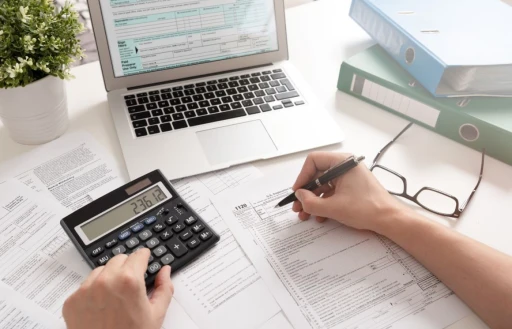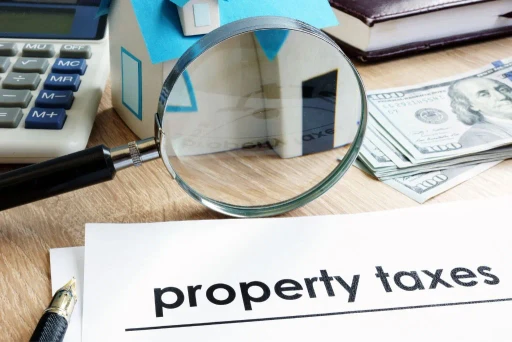

When you file your taxes, your property and county taxes may look similar. To be sure you don’t make any mistakes in calculating the tax you owe, it is crucial to understand the difference between these two.
Knowing what taxes you are subject to can make a huge difference when it comes to your long-term financial plans.
This article will cover property and county taxes in detail, how to calculate and pay them, and different tax rates by state and county.
A county tax is a property tax levied by the county to fund things like law enforcement, public education, and road maintenance. County tax can include taxes you pay for any property you own and are not limited to real estate. Personal property, like cars, boats, and even sales tax, can be included in county tax.
The elected commissioners will determine the tax rate for your county. The rate will be set according to the county’s budget and the taxable foundation of the county. The taxes fund the county’s services.
A property tax is the term used to describe taxes you pay for your real property. A county, city/town, or state imposes real estate property taxes on the real property you own. These taxes are specific to your property and are used to pay for state and local services and organizations.
Real estate taxes are determined by multiplying the assessed value of your home by your municipality’s predetermined tax rate.
These rates are different from state to state and are determined by commissioners. Larger cities tend to have higher tax rates, while more rural areas tend to have lower tax rates.
Several kinds of property taxes are applied to almost anything that you own. The different types of property taxes include:
The difference between a county and property tax lies in what “property” of yours is being taxed. Property taxes primarily consist of your real property, such as your house. The tax is determined based on the value of your home and the tax rate specific to where you live.
However, county tax can include a broader scope of property you own. For example, personal property like boats, cars, office equipment, etc., can be included. Depending on where you live, the type of property tax that you have to pay will differ.

Calculating your property taxes may seem difficult, given all of the different types of property taxes we mentioned before. However, it can be broken down into simple steps you can follow to ensure you are calculating it accurately.
The first step to calculating your property taxes is to find the market value of your real property.
For a house, this can be done in many ways:
The market value will be the first value you need in the formula used to calculate property tax. The value of your property may change over time, especially if you have made any large-scale renovations.
For this reason, getting a new appraisal or estimate after anything major is essential to ensure you are using an up-to-date value in your calculation.
The next step is to find the assessment rate set in place in your specific municipality or county. The county commissioner sets these rates and determines the percentage of your property's value that will be subject to your state’s tax rate.
Once you know your municipality's assessment rate, you multiply your property's market value by this assessment rate. This result is your property’s assessed value.
For example, a $100,000 home appraisal in a county with an 9% rate will have a municipality assessment rate of $9,000.
After calculating your property’s assessed value, the next step is to apply your local tax rate. Your local government sets these tax rates each year.
First, divide your property’s assessed value from the previous step by one hundred. After you have done so, multiply that number by your local tax rate. This product will be your estimated property tax bill for the year.
The formula will be (assessed value/100)*local tax rate. Using the $9000 assessed value from the example in the previous step, we will use an example tax rate of 7.5. So, our formula is (9000/100)*7.5, which equals 675. This means the estimated value of property taxes we owe is $675.
The final step in calculating your property taxes is subtracting any deductions you may be eligible for. Our estimated property taxes from the previous step assumes no deductions. However, if you pay rent or own real estate, you may be eligible to receive a tax credit.
The amount the credit is worth, and the specific eligibility requirements will vary by state and your situation. However, we highly recommend researching and applying potentials credits to reduce your tax liability.
To help you find out if you qualify for deductions and to help you find the market value of your home, you need to keep all necessary paperwork. Trustworthy is a helpful resource that can organize and store tax documents and important paperwork to make this process more manageable.

You can typically pay your property taxes by contacting your local government and sending payment. Cities, towns, states, counties, etc., will usually accept many forms of payment in many mediums. This includes in person at the city hall, by mail, phone, or online.
You must declare your personal property before you know how much you will pay. This is not your real property, such as your home, but any belongings you want legally to claim as property.
If you feel that the property tax you owe is too high, you can appeal. You can follow your local government’s official process of appealing, usually involving an online form or sending an email.
Keeping documentation such as a counter appraisal, similar properties’ prices, photo evidence of decreasing value, and your income information is important. These documents are always essential to keep and store properly. You can receive a lower tax bill if you prove that your property value is lower than what was assessed.
If you do not pay your property taxes, you will likely be subject to mortgage liens, foreclosure, or tax sales. In all these cases, the local government or a separate entity can claim ownership of your home if you do not pay off any subsequent debt.
A mortgage lien means your property will be collateral for your tax debt. The local government or other entities will have the right to use your property as collateral. This means you might lose property ownership if you don’t pay off the accumulated debts.
A foreclosure will occur under similar circumstances. If you cannot pay back the debt, your property will be taken by a separate entity and sold. Tax sales are similar in that if your taxes are unpaid, the local government can put your property up for auction and sell it to the highest bidder.
Tax sales often involve a redemption period where you are allowed a chance to repay your debt. However, the debt will accumulate interest during this time.

The states with the highest property taxes are as follows:
On the other hand, the states with the lower property taxes are as follows:
Property taxes are deductible and allow you to lower your taxable income. Property tax deductions prevent you from paying tax for interest and ensuring assessments are as equal as possible. The IRS offers deductions, such as the SALT deduction, for those who choose to itemize their deductions instead of taking standard deductions.
Miscellaneous charges that you paid likely are not deductible. However, payments you made for repairs or maintenance on your property could be deducted if the tax authority also itemizes them.
The counties with the highest property taxes are as follows:
The counties with the lowest property taxes are as follows:
Your local governments typically levies property tax for real property. On top of that, personal property is taxed by the state.
Property taxes are not only local but are sometimes levied by state governments. State governments typically only impose taxes on your personal property. This includes any movable, tangible property or intangible property you may have.
You must pay local property tax if you own any residential property within your city, county, school district, or town. Your local municipality will collect tax on any property within its jurisdiction to fund local services such as schools or police.
Organizations that can be exempt from property taxes are schools, religious buildings, non-profits, government properties, nursing homes, and museums. You may also be exempt if you meet a certain income or disability status. These exemptions are not automatic and usually involve an application process specific to the state or municipality.

Joel Lim has written articles for Business Insider, MSN, and various tech startups. Joel specializes in finance and technology content and holds a bachelor’s degree from Western Governors University.

Joel Lim has written articles for Business Insider, MSN, and various tech startups. Joel specializes in finance and technology content and holds a bachelor’s degree from Western Governors University.

Joel Lim has written articles for Business Insider, MSN, and various tech startups. Joel specializes in finance and technology content and holds a bachelor’s degree from Western Governors University.

Joel Lim has written articles for Business Insider, MSN, and various tech startups. Joel specializes in finance and technology content and holds a bachelor’s degree from Western Governors University.
Trustworthy is an online service providing legal forms and information. We are not a law firm and do not provide legal advice.